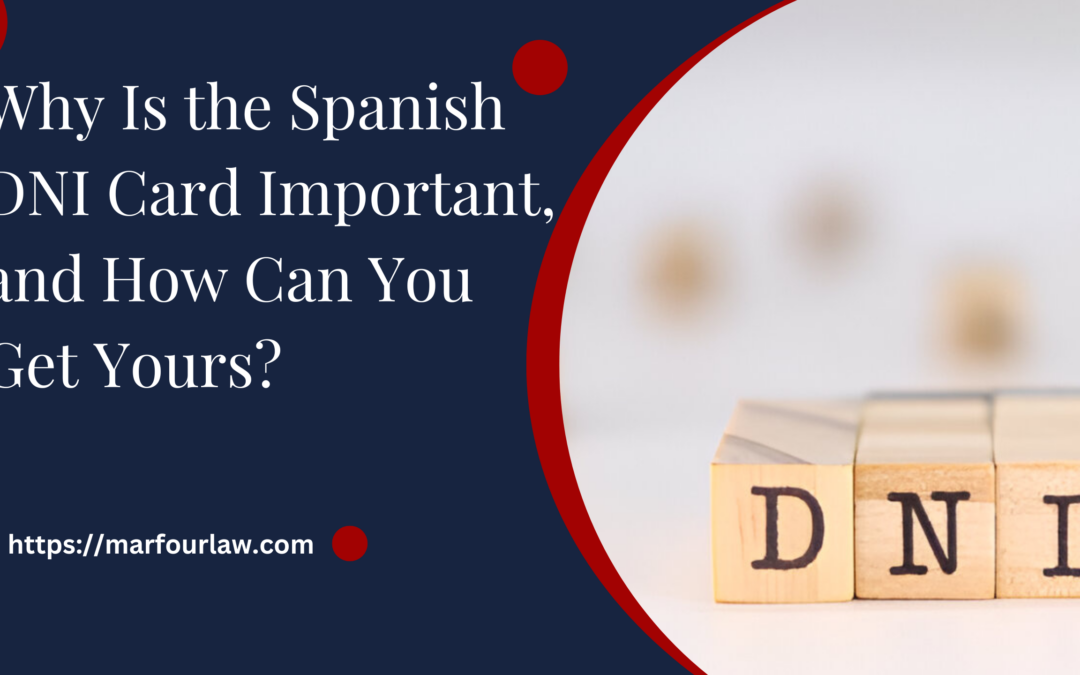The Spanish DNI card is an essential document that every Spanish citizen must have. Whether dealing with banks, getting a new job, or simply identifying yourself, this card is your all-access pass in Spain. But what exactly is it, and how does it differ from other identification methods? In this blog, we’ll dive into the details of the Spanish DNI card, explaining everything from its purpose to how you can renew it. We’ll also tackle the common questions about passports in Spain, appointments to renew your Spanish passport, and more.
What Is the Spanish DNI Card?
If you’re living in or planning to live in Spain, you’ve probably heard about the DNI card. But what exactly is it? Let’s break it down in a way that’s easy to understand.
A Quick Overview of the DNI Card
The DNI (Documento Nacional de Identidad) is Spain’s national identification card. Every Spanish citizen is required to have one, and it’s also available for foreign nationals who have obtained Spanish citizenship. It’s not just a random piece of plastic — this card is a key part of life in Spain. You’ll use it for things like opening a bank account, signing contracts, or even just proving your identity in everyday situations.
Why Is It So Important?
Think of the DNI card as your all-access pass in Spain. Without it, doing even the simplest tasks can become a headache. Whether you’re buying a house, picking up a package at the post office, or traveling within Europe, your DNI card will come in handy. In short, it’s your go-to ID for almost everything.
What Information Is Included on the DNI?
The card includes essential personal details like your full name, date of birth, and a unique number known as your “DNI number.” This number is like your personal fingerprint in the bureaucratic world of Spain — it’s used for everything from taxes to healthcare services. There’s also a photo of you and an electronic chip embedded for added security. The chip stores information and can be used for electronic transactions, making the DNI even more useful in today’s digital age.
How Do You Get One?
If you’re a Spanish citizen, getting your DNI is a straightforward process. You just have to apply at a police station that handles DNI requests. For foreign nationals who become Spanish citizens, the process is a bit more involved, but once you’ve got your paperwork in order, it’s just a matter of making an appointment. You’ll need to bring a few documents, like your birth certificate and proof of residency.
How Long Is It Valid?
The DNI card isn’t valid forever. Depending on your age, it needs to be renewed every five or ten years. For people over 70, the renewal period is longer, making it less of a hassle for senior citizens. The process for renewing the DNI is similar to applying for it, and it’s important to stay on top of this so you don’t run into any problems when your card expires.
How to Apply for a Spanish DNI Card?
Applying for a Spanish DNI card is a straightforward process if you know the steps. The DNI (Documento Nacional de Identidad) is essential for Spanish citizens and, in some cases, residents. It acts as an identification card. Let’s break down how you can apply for it without any hassle.

What Is the DNI Card?
The DNI card is your official identification document in Spain. It includes your personal details like your name, date of birth, photo, and an identification number. Think of it like a driver’s license in other countries but with a broader range of uses.
Who Needs a DNI Card?
If you’re a Spanish citizen, it’s a must-have once you turn 14. If you’re a foreigner with Spanish nationality or if you’ve just acquired Spanish citizenship, you’ll also need to apply for one. Without it, you’d miss out on many important functions like opening a bank account or getting government services.
Steps to Apply for a DNI Card
- Gather the Necessary Documents: Before anything else, make sure you have all the required paperwork. This usually includes your birth certificate, proof of address, and a passport-sized photo. If you’re a new citizen, you might need documents that prove your Spanish nationality. You’ll also need a completed application form, which you can often download online.
- Book an Appointment: In Spain, you can’t just walk into the office to apply for your DNI. You’ll need to book an appointment at your nearest police station. This can be done through the official government website. Be sure to choose a time and place that works best for you.
- Attend the Appointment: When the day of your appointment arrives, bring all your documents. You’ll have your photo taken if you haven’t provided one. Also, expect to provide fingerprints. The staff will review everything and make sure it’s in order. It’s not a long process, so don’t worry.
- Pay the Fee: There is a small fee for issuing the DNI. This can vary, but it’s generally affordable. You can pay it either online before your appointment or at the office when you go in. Keep the receipt just in case.
- Receive Your DNI: After completing all the steps, your new DNI card will either be handed to you on the spot or sent to you within a few days. Keep it safe, as it’s an important document you’ll need regularly.
When to Renew Your DNI Card
Once you have your DNI, keep in mind that it doesn’t last forever. Depending on your age and status, it needs to be renewed every five or ten years. The process is similar to the original application, but you might only need fewer documents.
Tips for a Smooth Application
- Double-check your documents before your appointment. You don’t want to be turned away because something is missing.
- Arrive on time for your appointment. Spanish offices can be strict about time.
- If you’re unsure about anything, ask the staff. They’re usually helpful and will guide you through any confusing parts.
In the end, applying for a DNI card is like putting together a puzzle. Once you have all the pieces (documents, appointment, payment), it comes together easily. Just take it one step at a time, and you’ll have your card in no time.
How Often Do You Need to Renew It?
When it comes to renewing certain things, whether it’s a visa, license, or contract, the timing can vary based on what it is and where you are. Let’s break it down so you know what to expect when it’s time to renew.
Check the Specific Requirements
Every situation is different. Some documents might need to be renewed every year, while others last longer. For example, many work visas require renewal after one or two years, while a driver’s license might need renewal every five to ten years, depending on local rules. Always check the specific requirements for your case, so you don’t miss the deadline.
Keep an Eye on Expiration Dates
It’s easy to forget when things need to be renewed, especially when the period is long. The best way to avoid this is by keeping track of the expiration dates. You can set a reminder on your phone or mark it on your calendar, so you get notified ahead of time. Missing a renewal date can lead to fines or even loss of the privilege you’re renewing, so staying organized is key.
Renewal Processes Can Vary
The renewal process might be as simple as submitting an online form, or it could involve providing updated documents, like proof of income or residence. Sometimes, you’ll need to attend an appointment or interview. The steps can be different depending on what you’re renewing, but it’s smart to start early, especially if there are a few hoops to jump through.
What Happens If You Forget?
Forgetting to renew can cause headaches. Depending on what’s expired, you might face late fees or even a suspension of certain rights or privileges. For example, letting a visa expire could lead to legal complications or even having to leave the country. It’s always better to renew ahead of time to avoid these problems.
Plan for the Future
Once you’ve gone through the renewal process, it’s a good idea to think about the next time you’ll need to do it. Some documents allow for longer renewal periods after you’ve had them for a while, so the process may get easier or more spaced out in the future. By planning ahead, you can avoid the stress of last-minute renewals and ensure everything stays in order.
Where Can You Use Each Document?
Understanding where and how you can use different documents is crucial for managing your personal and professional life. Let’s look at some common documents and where you might need them.

Passport
A passport is your golden ticket for international travel. You’ll need it to enter other countries, whether you’re going on vacation, visiting family, or on a business trip. Some countries also require it for identification purposes even if you’re not traveling. In addition to travel, a passport can be useful for opening bank accounts or applying for visas.
Driver’s License
Your driver’s license isn’t just for driving. It’s a key form of identification in many situations. You’ll use it when you’re renting a car, buying age-restricted items like alcohol, or even verifying your identity at various institutions. Many places accept a driver’s license as proof of identity and address, which can be handy for numerous everyday tasks.
Visa
A visa is essential if you’re looking to live or work in another country. It allows you to stay for a specific period, depending on the type of visa you have. For example, a work visa lets you work in the country, while a student visa allows you to study. Always make sure to check the terms of your visa to know exactly what you’re allowed to do and where.
Health Insurance Card
Your health insurance card is your go-to document for accessing medical services. Whether you’re visiting a doctor, going to the hospital, or filling a prescription, you’ll need to show this card to prove that you’re covered. It’s also useful for any health-related paperwork or if you need to claim medical expenses.
Social Security Card
In the U.S., a Social Security card is primarily used for tracking your earnings and calculating your benefits. It’s necessary for starting a new job, applying for loans, and sometimes even for opening bank accounts. Although it’s not always required for everyday activities, having it handy can help in various administrative processes.
Contract or Lease Agreement
A contract or lease agreement outlines the terms of a rental or service arrangement. You’ll use it to confirm your rights and obligations, whether you’re renting an apartment, hiring a service, or entering into a business deal. This document can be crucial in disputes or when proving your arrangement with another party.
Each document serves a specific purpose and knowing where and how to use them can make your life smoother and more organized. Keep these documents in a safe place and be aware of their uses to ensure you’re always prepared.
FAQs
What is the cost of obtaining or renewing a Spanish DNI card?
The fee for obtaining or renewing a Spanish DNI card is generally around €12, though it may vary depending on specific circumstances like large families or other exemptions.
Can foreigners living in Spain get a Spanish DNI card
No, the Spanish DNI card is only for Spanish citizens. Foreigners living in Spain receive a NIE (Número de Identificación de Extranjero), which serves a similar purpose for non-citizens.
How far in advance should I book my appointment to renew my Spanish DNI card?
It’s advisable to book your renewal appointment at least one to two months in advance to ensure you secure a convenient date and avoid any delays.
Conclusion
The Spanish DNI card is more than just a piece of plastic; it’s a vital document for every Spanish citizen. Whether you’re applying for it for the first time or renewing it, understanding the process can save you time and hassle. Keep your DNI card updated, and don’t forget that it’s different from your passport in Spanish—you’ll need both for different situations!

